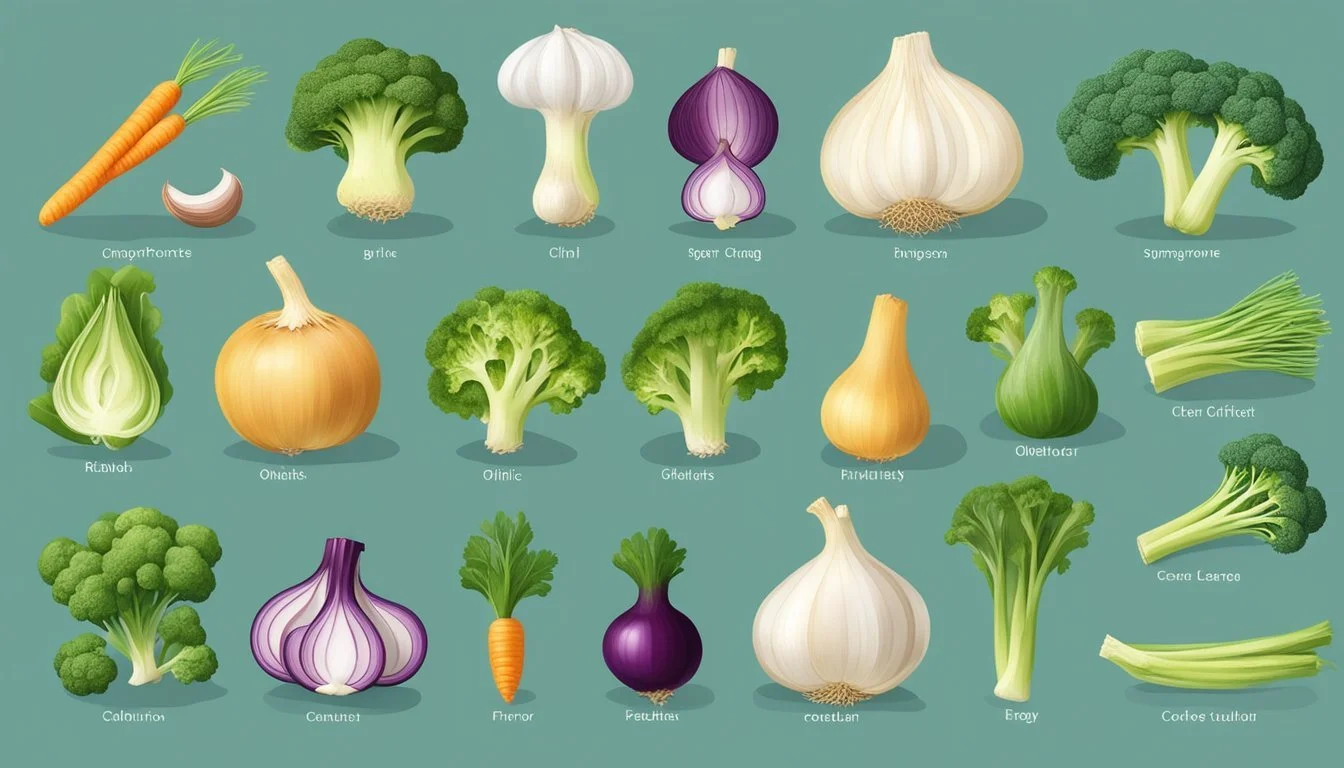8 Essential Foods High in Sulfur for Better Health
Key Health Benefits and Sources
Sulfur is an essential mineral that plays a critical role in many of the body's functions, including supporting the immune system and aiding in the synthesis of essential proteins. This article explores various sulfur-rich foods and sheds light on their importance in a balanced diet.
Understanding which foods are high in sulfur can help optimize your nutritional intake and improve overall health. By incorporating sulfur-rich proteins, vegetables, and other food sources, individuals can benefit from reduced oxidative stress and inflammation, as well as enhanced antioxidant levels.
1) Garlic
Garlic is a highly regarded source of sulfur and has been a staple in culinary traditions and medicinal practices for centuries. Rich in allicin, alliin, and diallyl sulfide, garlic contributes significantly to dietary sulfur intake.
These sulfur compounds are believed to offer various health benefits. They may support the immune system, enhance cardiovascular health, and have anti-inflammatory properties. The potent aroma and flavor of garlic are also attributed to its sulfur content.
In addition to its sulfur compounds, garlic contains various vitamins and minerals. It is particularly high in vitamin C, vitamin B6, and manganese, adding to its nutritional profile.
Garlic can be utilized in a variety of dishes, ranging from soups and stews to sauces and dressings. Its versatility in cooking makes it an essential ingredient for both flavor and health.
2) Onions
Onions are a versatile and flavorful addition to many dishes. They are also rich in sulfur compounds, which contribute to their distinct aroma and taste. These compounds include alliin and allicin, known for their potential health benefits.
Sulfur in onions has anti-inflammatory and antioxidant properties. These properties can help reduce oxidative stress and inflammation in the body. Onions are also known to support the immune system due to their sulfur content.
There are various types of onions, such as red, white, and yellow. Each type contains these beneficial sulfur compounds. Including a variety of onions in your diet can provide different flavor profiles and health benefits.
Onions can be eaten raw, cooked, or used as a base for soups and stews. Cooking onions may reduce some of their sulfur content, but they still retain significant health benefits. Incorporating onions into meals is an easy way to boost sulfur intake.
3) Leeks
Leeks are a member of the Allium family, which includes garlic, onions, and shallots. They are notable for their sulfur-containing compounds. These compounds contribute to various health benefits, making leeks a valuable addition to one's diet.
Leeks are associated with a reduced risk of several cancers. The organosulfur compounds in leeks play a role in this protective effect. These compounds may also help lower bad cholesterol levels, promoting heart health.
High in fiber, leeks can aid in digestion and help reduce inflammation. Their fiber content supports gut health, potentially guarding against conditions like leaky gut syndrome. Leeks are versatile and can be easily incorporated into soups, stews, and salads.
4) Shallots
Shallots are a notable source of sulfur, containing compounds like allyl propyl disulphide and cysteine derivatives. These sulfur compounds are known for their health benefits.
One health advantage is their antimicrobial effect, which helps in combating infections. Additionally, sulfur in shallots contributes to reducing inflammation and supporting overall immune function.
Furthermore, shallots provide antioxidants that protect the body from oxidative stress. Their inclusion in the diet can bolster the body's defense mechanisms.
Cooking with shallots is easy and versatile. They can be used in a variety of dishes, adding a subtle yet distinct flavor. Whether sautéed, roasted, or raw, they enhance both taste and nutritional value.
Shallots' sulfur compounds also help in detoxifying the body by aiding the liver’s function. Regular consumption can support overall health.
5) Chives
Chives are a nutrient-rich food that brings more than just flavor to dishes. They are particularly noted for their sulfur content, which plays a significant role in various bodily functions and health benefits.
Chives contain compounds such as alliin and allicin, which are sulfur-based. These compounds have been studied for their potential to deter the growth and spread of cancerous cells.
Rich in vitamins A and C, chives also offer a high antioxidant content, boosting the immune system and supporting skin health. Used frequently in garnishes, their nutritional impact can be surprisingly significant despite being used in small quantities.
Their versatility in culinary uses makes them an easy addition to various dishes. Adding a tablespoon of chives to salads, soups, or omelets not only enhances flavor but also supplements your diet with beneficial nutrients.
To maximize their benefits, chives should be added fresh to dishes rather than cooked, as heat can degrade some of their nutritious properties.
6) Broccoli
Broccoli is a sulfur-rich vegetable belonging to the cruciferous family, which also includes cauliflower, cabbage, and kale. This green vegetable is packed with essential nutrients and is particularly noted for its high sulfur content.
Sulfur in broccoli appears mainly in the form of glucosinolates, compounds that can break down into various biologically active sulfur-containing substances. These compounds contribute to broccoli's potential health benefits.
Rich in antioxidants, broccoli supports the body's defense mechanisms. The sulfur compounds, in combination with vitamins and minerals present in the vegetable, help reduce inflammation and enhance immune function.
Broccoli is easy to add to various dishes, whether steamed, sautéed, or incorporated into soups and salads. Regular consumption can help provide the body with a consistent supply of sulfur.
This vegetable stands out not only for its health benefits but also for its versatility in the kitchen, making it a beneficial addition to a balanced diet.
7) Cauliflower
Cauliflower is a cruciferous vegetable known for its versatility and nutritional benefits. Rich in sulfur, it plays a vital role in supporting various bodily functions. Sulfur is essential for the synthesis of amino acids, enzymes, and proteins.
Cauliflower is low in calories but high in vitamins C and K. It also contains fiber, supporting digestive health. The sulfur compounds in cauliflower contribute to its characteristic taste and potential health benefits, such as anti-inflammatory properties.
Incorporating cauliflower into meals is simple. It can be steamed, roasted, or used as a low-carb alternative for rice and mashed potatoes. Its ability to absorb flavors makes it a favorite in various cuisines around the world.
Cooking method can affect cauliflower's sulfur content. Lightly steaming retains more nutrients compared to boiling. Including cauliflower in a balanced diet can help ensure adequate intake of sulfur and other essential nutrients.
8) Brussels Sprouts
Brussels sprouts are a notable source of sulfur, a nutrient vital for various bodily functions. They are particularly rich in sulforaphane, a sulfur-based compound known for its antioxidant properties.
These small, cruciferous vegetables are also high in vitamins. A cup of cooked Brussels sprouts offers 182% of the daily value for vitamin K and 107% for vitamin C.
Including Brussels sprouts in the diet can support bone health due to their high vitamin K content. Additionally, their vitamin C helps strengthen the immune system and promotes healthy skin.
Brussels sprouts can be prepared in various ways. Roasting, steaming, or sautéing can preserve their nutritional content while enhancing their natural flavors. Adding these veggies to salads, stir-fries, or even as a side dish can make meals more nutritious.
9) Cabbage
Cabbage is a cruciferous vegetable rich in sulfur. It is widely used in various cuisines around the world due to its versatile nature.
Green and red cabbage varieties are both good sources of this essential mineral. Sulfur contributes to the vegetable's characteristic flavor and aroma.
In addition to sulfur, cabbage is high in fiber, vitamin C, and vitamin K. These nutrients make it a valuable addition to a balanced diet.
Cabbage can be enjoyed raw, fermented, or cooked. Whether added to salads, stir-fries, or soups, its sulfur content remains beneficial.
10) Kale
Kale, a popular leafy green, is known for its high sulfur content. It belongs to the cruciferous family of vegetables, which includes other sulfur-rich foods like broccoli and cauliflower.
The sulfur in kale is primarily found in the form of glucosinolates. These compounds break down into active forms that contribute to the vegetable's distinctive flavor and nutritional benefits.
Regularly consuming kale can support metabolic health due to its sulfur compounds. These compounds assist in the production of essential enzymes that detoxify the body and support liver function.
Kale is also rich in vitamins A, C, and K, making it a nutrient-dense addition to any diet. Its high fiber content promotes digestive health.
Including kale in meals can provide a variety of health benefits, including anti-inflammatory properties. This can be particularly beneficial for individuals looking to manage conditions like arthritis.
Kale can be enjoyed in salads, smoothies, or lightly sautéed. Its versatility makes it an excellent ingredient for those seeking to increase their intake of sulfur-rich foods.
Health Benefits of Sulfur-Rich Foods
Sulfur-rich foods offer significant benefits, especially concerning detoxification processes and joint health. Here’s an in-depth look at these critical health aspects.
Role in Detoxification
Sulfur plays a crucial role in the body’s detoxification processes. It is a vital component of glutathione, one of the body’s most potent antioxidants. Glutathione helps neutralize free radicals and supports the liver's detoxification functions.
Cruciferous vegetables like broccoli and kale are rich in sulfur compounds such as glucosinolates. These compounds activate liver enzymes that aid in the detoxification of harmful chemicals and toxins. Consuming these vegetables can enhance the body’s ability to eliminate toxins.
Foods rich in sulfur for detoxification:
Broccoli
Cauliflower
Kale
Cabbage
Support for Joint Health
Sulfur is integral to the formation of connective tissues. It assists in the creation of collagen and keratin, essential for joint health and skin elasticity. A regular intake of sulfur-rich foods can support joint health and reduce symptoms of arthritis.
High-sulfur foods like garlic and onions contain compounds that may help reduce inflammation and oxidative stress in the joints. This can lead to improved joint mobility and decreased pain for those suffering from joint conditions.
Key sources of sulfur for joint health:
Garlic
Onions
Eggs
Fish and seafood
Incorporating sulfur-rich foods into one's diet can offer substantial benefits, from detoxification to enhanced joint health, contributing to overall well-being.
Metabolic Functions of Sulfur
Sulfur plays crucial roles in the human body's metabolism, particularly in protein synthesis and overall metabolic activity. Its presence in amino acids like methionine and cysteine underscores its importance in various biochemical pathways.
Involvement in Protein Synthesis
Sulfur is essential for synthesizing specific amino acids, particularly methionine and cysteine. Methionine is an essential amino acid that must be obtained from the diet, while cysteine can be synthesized in the body but still relies on sulfur availability.
These amino acids are crucial for making proteins, which are fundamental to cellular structure, function, and repair. Sulfur-containing amino acids also contribute to enzyme activity. Enzymes catalyze many of the body's biochemical reactions, ensuring that metabolic processes proceed efficiently.
Impact on Metabolism
Sulfur is involved in the metabolism of essential nutrients. It assists in the conversion of food into energy, particularly through pathways that involve sulfation, a process adding sulfur to molecules to make them more water-soluble and easier to excrete.
Sulfur also participates in detoxification in the liver, where it aids in eliminating toxins through the sulfation pathway. Furthermore, sulfur is a component of insulin, the hormone regulating blood sugar levels, significantly impacting carbohydrate metabolism.






